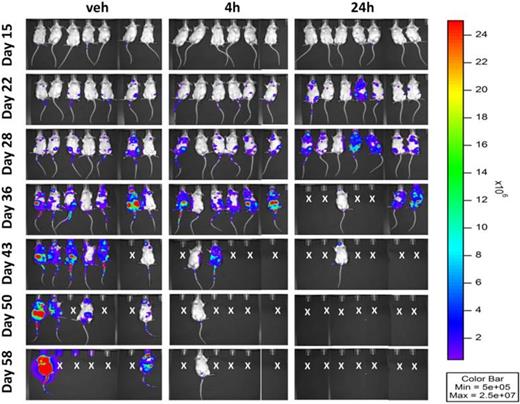Abstract
Multiple myeloma (MM) is a chronic progressive malignancy of plasma cells. Although treatment with the novel proteasome inhibitor, bortezomib, significantly improves patient survival, some patients fail to respond due to the development of de novo resistance. Previous studies revealed that chemotherapy induces pro-tumorigenic host-mediated effects which could explain tumor re-growth and metastasis(Gingis-Velitski, Loven et al. 2011, Katz, Shaked 2014). Here we show that plasma from bortezomib-treated mice significantly increases migration, viability and proliferation of human MM cells in vitro, compared to plasma from control untreated mice. Comparable results were demonstrated with plasma obtained from patients with MM treated with bortezomib. Additionally, bortezomib induces the mobilization of pro-angiogenic bone marrow cells. Mice treated with bortezomib and subsequently intravenously injected with MM cells succumb to MM aggressiveness earlier than mice treated with the vehicle control(Figure 1). We show that pro-inflammatory macrophages contribute to MM cell aggressiveness in response to bortezomib treatment, in part by secreting interleukin-16(IL-16). Blocking IL-16 in conditioned medium obtained from bortezomib-treated macrophages generated reduced viability of MM cells in vitro. Accordingly, co-inoculation of MM cells with pro-inflammatory macrophages from bortezomib-treated mice accelerates MM disease progression. Taken together, our results suggest that, in addition to the known effective anti-tumor activity of bortezomib, this drug can induce host-driven pro-tumorigenic effects that may promote MM aggressiveness.
Host response to bortezomib promotes MM aggressiveness in mice. Eight week old CB.17 SCID mice were injected intravenously with 1mg/kg bortezomib or vehicle (veh). Four and 24 hours later mice were inoculated through the tail vein with 5x106 CAG-luciferase+ cells (n=6-7mice/group). Tumor growth and expansion was assessed by IVIS imaging system.
Host response to bortezomib promotes MM aggressiveness in mice. Eight week old CB.17 SCID mice were injected intravenously with 1mg/kg bortezomib or vehicle (veh). Four and 24 hours later mice were inoculated through the tail vein with 5x106 CAG-luciferase+ cells (n=6-7mice/group). Tumor growth and expansion was assessed by IVIS imaging system.
No relevant conflicts of interest to declare.
Author notes
Asterisk with author names denotes non-ASH members.


